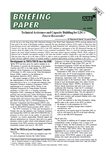Development and International Relations
Raymond Saner & Lichia Yiu
The purpose of this paper was to assess how far Jamaica has come regarding women economic empowerment, female entrepreneurship and its development policies in favour of women entrepreneurship development. The study thus provides a rare glimpse of the entrepreneurship ecosystem in Jamaica.
While global policy has been promoting women empowerment through entrepreneurial development, little is known on the actual outcome of such human capital investment strategy and the critical vectors that contribute to such outcome. This scarcity of knowledge is also applicable to Jamaica.
This paper attempts to contribute to women entrepreneurship research by reaching beyond the output-oriented perspective of various skill development programmes and attempts to link policy choice with overall macro results of entrepreneurship development in general and women entrepreneurship development in specific.
The International Monetary Fund's Influence on Trade Policies of Low-income Countries: A Valid Undertaking? (August 2007).
Author: Saner, R. & Guilherme, R.
![]() As part of the work programme of the Geneva Trade and Development Unit, a comprehensive analysis was undertaken of the 29 Diagnostic Trade Integration Studies (DTIS) available as of October 2008 to assess whether and to what extent the DTISs provide concrete recommendations and actions which can support comprehensive strategies for promoting, upgrading, diversification and value addition in manufacturing and related industrial development activities associated with commodity production. Although DTISs were not designed as a commodity development tool, it is important to recognise that for most of the Least Developed Countries primary commodities including agricultural and mineral commodities are the main source of income, employment and trade. For many of these countries, their journey out of poverty is linked to the development of the commodity sector.
As part of the work programme of the Geneva Trade and Development Unit, a comprehensive analysis was undertaken of the 29 Diagnostic Trade Integration Studies (DTIS) available as of October 2008 to assess whether and to what extent the DTISs provide concrete recommendations and actions which can support comprehensive strategies for promoting, upgrading, diversification and value addition in manufacturing and related industrial development activities associated with commodity production. Although DTISs were not designed as a commodity development tool, it is important to recognise that for most of the Least Developed Countries primary commodities including agricultural and mineral commodities are the main source of income, employment and trade. For many of these countries, their journey out of poverty is linked to the development of the commodity sector.
 In the run up to the Hong Kong (HK) Ministerial Meeting of the World Trade Organisation (WTO), growing attention has been paid to the needs of developing countries, especially the least developed countries (LDCs) many of whom face depend persistent poverty and indebtedness. Judging from the draft Ministerial Text submitted by Chairman of the General Council (GC) and the Director-General (DG) to the WTO members in anticipation of the HK Ministerial Meeting, the concern about the plight of the LDCs seems to have increased considerably. There is a need for initiating measures to improve the trade related technical assistance (TRTA) and trade related capacity building (TRCB). While calling for improved aid is laudable and urgently needed, at the same time member countries should take a step back and reflect on what has been done so far in the name of TRTA in order to reach an agreement on TRTA at the HK Ministerial Meeting which will have sufficient chances of actually leading to sustained improvement of living conditions in the LDCs.
In the run up to the Hong Kong (HK) Ministerial Meeting of the World Trade Organisation (WTO), growing attention has been paid to the needs of developing countries, especially the least developed countries (LDCs) many of whom face depend persistent poverty and indebtedness. Judging from the draft Ministerial Text submitted by Chairman of the General Council (GC) and the Director-General (DG) to the WTO members in anticipation of the HK Ministerial Meeting, the concern about the plight of the LDCs seems to have increased considerably. There is a need for initiating measures to improve the trade related technical assistance (TRTA) and trade related capacity building (TRCB). While calling for improved aid is laudable and urgently needed, at the same time member countries should take a step back and reflect on what has been done so far in the name of TRTA in order to reach an agreement on TRTA at the HK Ministerial Meeting which will have sufficient chances of actually leading to sustained improvement of living conditions in the LDCs.
CSEND conducted research on how to best include employment and decent work into the Poverty Reduction Strategy Papers (PRSP), the successor instrument of the IMF/WB following their failed Structural Adjustment Programme (SAP). CSEND drafted a major document titled "Decent Work and Poverty Reduction Strategies: An ILO Advocacy Guidebook" and developed a 24 role negotiation simulation concerning PRSPs. The simulation was pilot-tested in Ethiopia (2003) and Cameroon (2005). The Guidebook was published by ILO, Geneva, April 2005.